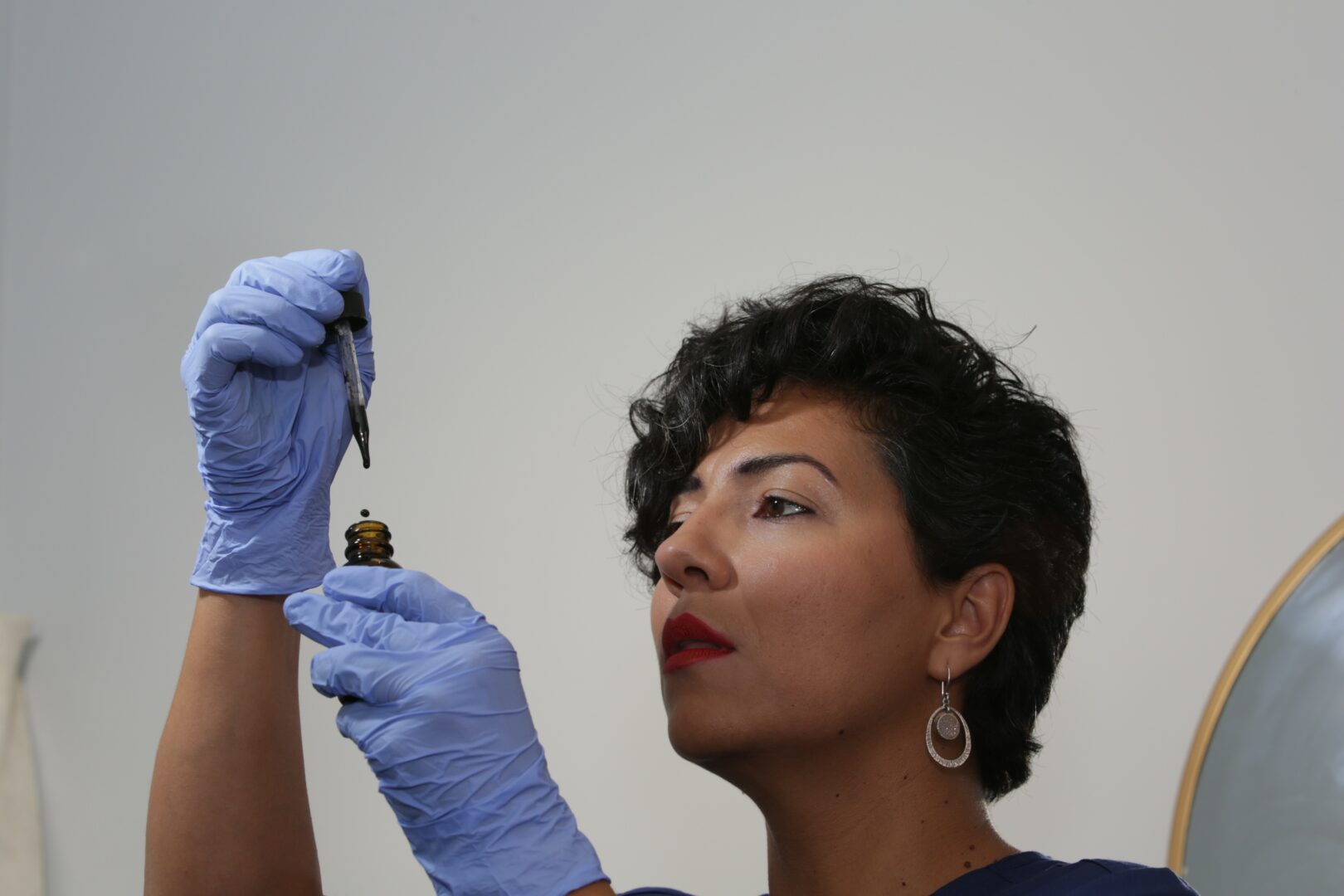We were lucky to catch up with Andrea Echeverry recently and have shared our conversation below.
Hi Andrea, really happy you were able to join us today and we’re looking forward to sharing your story and insights with our readers. Let’s start with the heart of it all – purpose. How did you find your purpose?
Life has always seemed to lead to the right place, time or encounter even when that was not my original “plan”. Many times, it felt like I was taking only left turns, but deep down I knew the path itself would eventually show me the reasons why the road felt like it had not been set with a clear destination. Despite being trained to become an academia scientist, I had always wanted to become involved in some form of activism, where I could serve the public, and the planet. This path of many left turns started just 12 yrs ago when I first became a scalp micropigmentation artist. Being one of the first in the world to learn and optimize this paramedical technique plunged me deeply into the science of scalp and hair follicle health and how it related to hair loss. Eventually, what started as a cosmetic procedure to help balding men feel more comfortable in their own skin, would take me full circle back into my original training as a Microbiologist and Immunologist. So now, my focus is skin and scalp microbiome health awareness, education, and research advocacy. It was through the heart-wrenching stories being told by my balding clients that I had the realization that modern humans losing hair had no reliable and accurate informational resources to guide them through this difficult process. I realized then that my own nephews would eventually face similar challenges as my clients did, so preventing those I love from having the same experiences has inspired me to advocate for them and all the young people facing glaring misinformation being spread in the hair loss industry.


Thanks, so before we move on maybe you can share a bit more about yourself?
After a decade of working one-on-one with people struggling with botched hair transplantation in Florida, Georgia, and Puerto Rico, I’ve decided to take a step back in my business and focus part of my time to supporting hair loss practitioners and Trichologists through the Association of Professional Trichologists (APT). The APT is a Chicago-based non-profit founded in 2023 by scientists and practitioners of Trichology concerned with the current state of the hair loss industry. I serve as the President of the APT for 2024-2025. As a non-profit, our collective efforts are now directed towards creating the first credentialing program in the U.S. for practitioners of Trichology and hair loss treatments. Trichology is considered a holistic, whole-body approach to addressing scalp and hair growth disfunction that may be complementary to treatments offered by medical practitioners and Dermatologists. Unfortunately, we have identified a concerning level of distrust and animosity between practitioners of Trichology and medical professional including hair transplant surgeons that we hope to bridge by elevating and standardizing the implementation of hair loss treatments with scientifically-backed curriculum. We have joined the voices of other hair loss practitioners who face similar challenges around the world, which demonstrates that there is a need for this concerted effort. We hope that in the next few years, people of all ages suffering from hair loss have a clear path of action through the combined efforts of all professionals who are involved in scalp and hair health including hair stylists, barbers, braiders, loctitians, and cosmetologists. We are also committed to bringing on board key industry stakeholders that develop products and technologies in the scalp and hair space such as researchers and cosmetic companies. We believe that by fostering integration in the hair loss industry the public can benefit the greatest. I feel blessed to serve the community at large through this endeavor and would like to invite others who feel the pressing need to give back and contribute to a brighter future by donating their time, expertise or money to our cause by visiting www.trichologyassociation.org or reaching out to me directly.
I’m also focusing on a bilingual (English/Spanish) web series capturing the hair loss stories of clients, friends, family members, and colleagues. It is meant to be an educational and cautionary tale of the mistakes they have made in their hair loss journey. I’m starting with some stories that have already been fully fleshed out in real life, while others are more reflective of current and ongoing stories. This is yet another project that I have been working on and off for a few years and it is time for the public to experience these stories from the point of view of those I serve.


Looking back, what do you think were the three qualities, skills, or areas of knowledge that were most impactful in your journey? What advice do you have for folks who are early in their journey in terms of how they can best develop or improve on these?
To become a specialist in any field, it is essential to focus on the details, integrating new information, while maintaining an open mind to allow us to see the big picture. There is humility in realizing that the more we think we know, the less we know. This humility has allowed me to remain outside of the ideological boundaries that often constrict the development of new concepts in science. I realized early on in my career that knowledge is something that develops over time and it’s not just the result of receiving a diploma. I’ve been very fortunate to have found mentors along my journey who encouraged me to think outside the box and pursue my own ideas, so I recommend people to seek someone’s mentorship early in their careers. The path forward is less daunting when we align ourselves with people who trailblazed before us. This has also allowed deep personal connections and establishing a network of people who support and encourage exploration. Many individuals with entrepreneurial ambitions believe that there is more value in doing everything themselves and that there is more merit to their success, the harder the journey travelled. The most successful paths are rarely walked alone, so I believe in finding a balance between self-reliance and connection to embrace the journey of lifelong learning.


We’ve all got limited resources, time, energy, focus etc – so if you had to choose between going all in on your strengths or working on areas where you aren’t as strong, what would you choose?
Interesting question! This is something I wondered about a few days ago. It is certainly easier to lean on what one believes to be a strength than to focus on improving a weakness. Strengths may be skills that already come naturally, or one has already worked hard to master; but identifying weaknesses helps us gain clarity about the next steps to take and be more intentional in our actions and efforts. This is something that I have thought about a lot now that I’m entering a transitional point in my career. The training I received while becoming a scientist has been instrumental to get me to this point, but to fully materialize my new objectives, I’ve realized I need to become a different type of communicator. Scientific writing is meant to disseminate ideas to a small group of people who can understand the style and jargon. However, informal communication of scientific knowledge is an art, where we attempt to make complex concepts easily digestible to a larger audience. This is why I decided to use audiovisual art rather than formal writing, like books or articles, to fully capture the essence of my research and realizations into something tangible that can be understood by a wider audience. Since some of these concepts are related to the microscopic world and how it influences the macroscopic world, I firmly believe that film is the only medium where I can fully flesh out these concepts. So, with this realization I have been drawing motivation from some early life inspirations like Carl Sagan, who was the first scientist I saw on TV when I was a little girl in Colombia. Presenting complex data in the simplest terms on video is a skill that requires practice. So, I’m honing on new skills by learning about documentary production to become a visual storyteller. It’s a very exciting transition for me since cinema has been a lifelong passion, but I have never fully experienced being on the other side of the camara lens as a producer. So, in this case, mastering these new skills is a way to strengthen my weaknesses.
Contact Info:
- Website: https://www.drandreaecheverry.com
- Instagram: http://www.instagram.com/drandreaecheverry
- Linkedin: http://linkedin.com/in/drandreaecheverry
- Twitter: http://x.com/@drandreaechePhd
- Youtube: http://www.youtube.com/@hairpigmentcenter





so if you or someone you know deserves recognition please let us know here.




